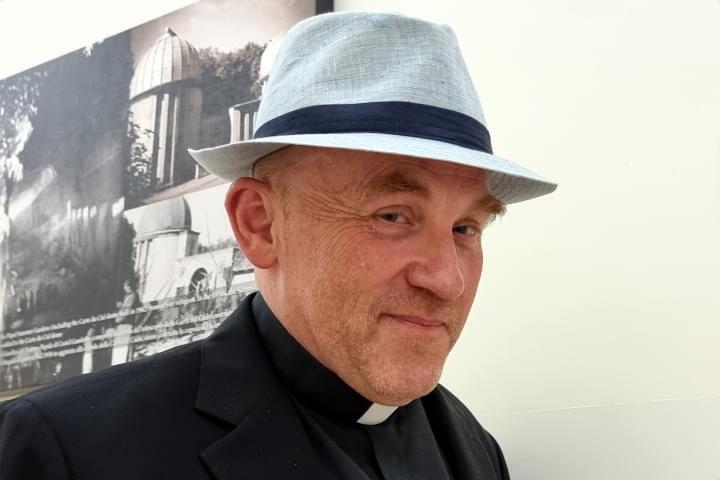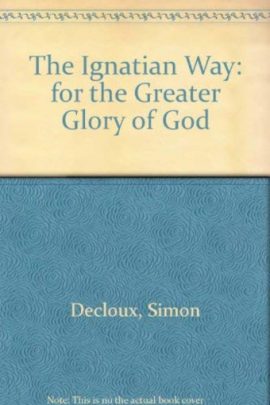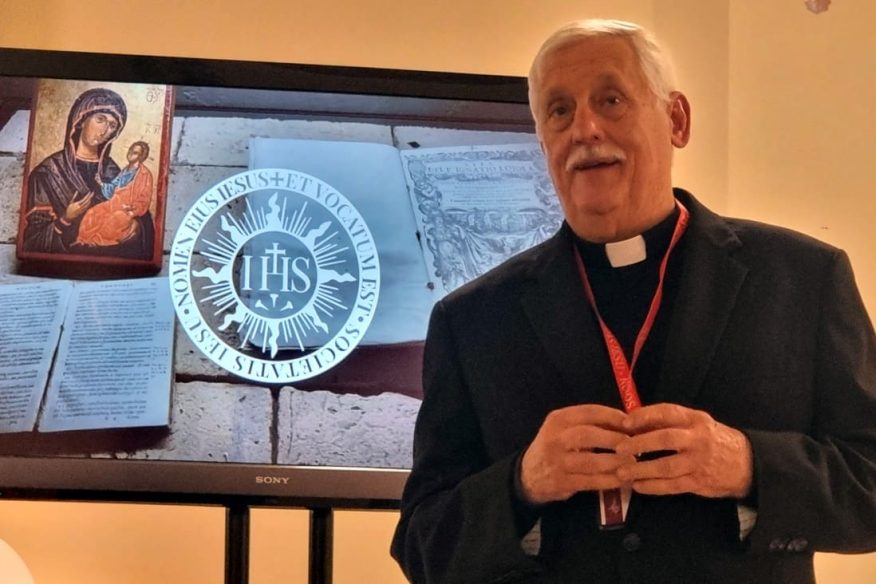Gabriele Gionti SJ
Science as prayer
I have a great passion for Star Wars, art-house films and pizza margherita. Notebook and pen always on the table, to question the universe.

I’m from Capua, where Spartacus started his journey! I got my first telescope when I was 12. We used to go up on the roofs of houses to see the starry sky: the moon, several planets, Jupiter and the Medicean satellites, Saturn, the Lyra nebula… huge, fascinating. After high school I wanted to study astronomy, but I realised that I was more inclined towards theoretical physics. I graduated in Naples on gravity and earned a doctorate on the quantum theory of gravity at the Scuola Internazionale Superiore di Studi Avanzati in Trieste.
A long discernment
Some events were fundamental for the maturation of my vocation. I was baptised in the church that used to belong to the Jesuits then passed on to the Capuchins. During catechism I remember feeling happy. I will never forget the freedom of Fr Roberto who spoke of respect and love for the Muslim religion. In the oratory, I experienced the closeness of the Lord. Then the tumultuous years of adolescence followed, high school, the Marxist philosophy teacher who said that religion is a superstition, the search for a new identity, the inability to find concrete answers, everything seemed groundless. I was changing affectively and relationally. At university I also enrolled in physics to see if studying science could challenge my faith. On the contrary, the more I studied, the more I realised that the God of love I believed in was reconcilable with science. And I understood this more through my heart than through reasoning. In physics I found people with whom I shared certain interests, but I continued to feel the pressure of society: that idyllic world I had been told about was not functioning. This was during the 1980s. I was confronted with materialism, hedonism, and I couldn’t reconcile it with what I had experienced as a child. In the 4th year, during the theoretical physics course, a friend who was discerning his vocation told me about a God who was speaking to me, answering my questions. Immediately my heart was opened. Immediately my heart was opened. He gave me the book Prayers to the Heart of Jesus during the month of June .
The fall from the horse
“Something started to change. I was trying to finish my doctoral thesis. It was all very interesting, but I realised that my thesis research would lead to nothing. I looked for a second, more competent supervisor, to write a thesis and research that would lead to something, but I was afraid that this second project of mine would be rejected. The Lord made me realise that my road to fulfilment was not only through my thesis. Despite serious problems with the first supervisor, out of the pride of both of us, I managed to finish my thesis, which was accepted. It combined quantum gravity and general relativity. But it became clear that science and an academic career were no longer the centre of my life, nor did they only fill my heart.
In search of a true vocation, on the web
More questions started to surface. Which vocation should I choose? Marriage? Consecrated life? I was 30 years old. I searched the web: I browsed from the site of the Dominicans to that of the Franciscans and so on. I felt that I would fit into religious life. I found the site of the Italian Province of the Jesuits, set up at that time by Fr Francesco Tata. I was attracted to their spirituality. A book by Teilhard de Chardin helped me understand that the Catholic Church questions itself on significant issues and manages to give profound answers. In the past, I had the impression that the Church gave pre-packaged and dogmatic answers without any regard for contemporary culture.
I went to the Gesù Nuovo church in Naples. I contacted Fr Sibilio, then vice provincial of the South. He entrusted me to Fr Armando Gargiulo, who had been the first provincial of Italy. In the meantime, I won a postdoctoral scholarship at the University of California at Irvine. An American Jesuit followed me there for spiritual direction. I returned to Italy for the experience of the Spiritual Exercises in Naples in the Cappella Cangiani house. I spent some time giving service by assisting the sick. Fr. Sibilio also introduced me to the reality of the Vatican Specola. On 4 October 2000 I entered the novitiate.
An arduous journey
I experienced some tensions in community life due to the difference in ages and backgrounds of those present. I matured progressively from a human and affective point of view. I still had questions to which I had found no answers. I went through my philosophy years, then 2 years of Regency in Tucson, Arizona at the Vatican Specola, and 4 years of theology, 3 of which in Berkley and one in Naples. It was a long road, full of ups and downs, in constant dialogue with the Superiors.
By now my dreams of vainglory had been unmasked and my world view was deeply changed. I used to think that the vocation itself depended very much on me and my decisions, attempting constantly to combine personal interests and possible routes, in reality fearing total reliance on God. Then I became aware that it is God who is choosing and giving me a gift. My affective maturity meant that I could give proper weight to things, for what they are worth, in the knowledge that the Lord’s vocation is worth much more than any dream one might have. I was helped through prayer, the Spiritual Exercises, carefully interpreting the events of life through which God speaks to me and which show me how things stand”.
Contemplating the heavens
There are 15 Jesuits engaged in the research of astronomy and astrophysics at the Specola: 8 at Castel Gandolfo and 7 in Arizona. This mission was entrusted to the company by the Pope in 1906. The research activity is preceded in the morning by prayer. Then follows the reading of the articles, writing and the contacts with scientific collaborators. We don’t teach, so we have more time for research but also less incentive and questions to trigger us.
And then there is community life: the 10 o’clock coffee break, meals, the 7 o’clock mass’ and giving service to the inmates of the Velletri prison.
Every now and then the eye returns to scrutinising the sky. The domes of the Specola open up and the powerful telescopes take the sight far into the distance.
We are studying the first instances of the universe after the Big Bang, when the universe is assumed to have been as small as a dot, dense and having very high temperatures. The speed of light is 300,000 km per second. We assume that the maximum speed at that time was zero.
Science as prayer
To seek and find God in all things. This is the last exercise proposed by St Ignatius in the Spiritual Exercises. Scientific research is this search for those laws by which God works in nature, in which His Son became incarnate, as we find in the Contemplatio ad Amorem. In this way, science becomes a prayer and a way that helps men and women to come closer to God. Studying the universe reminds me that we are not its centre, that other realities, civilisations, forms of life are possible. It shows me the beauty of this earth, which we are in danger of ruining, and restores the wonder present in the cosmos, creation and its incredible order.

